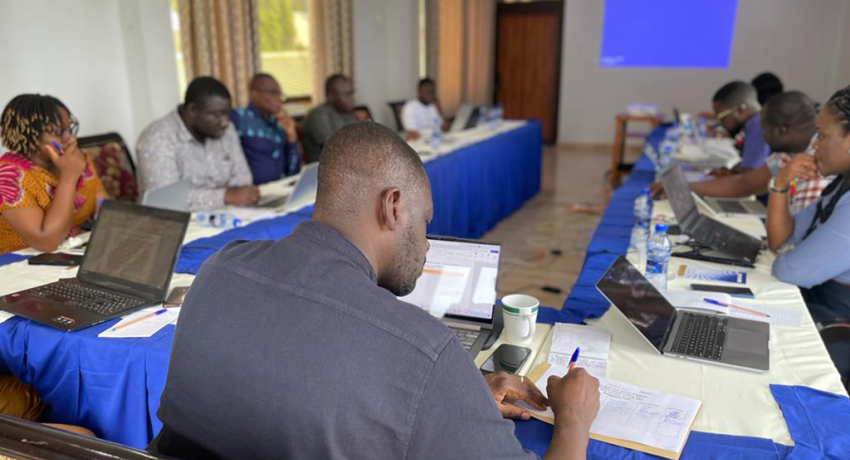Steps were taken to ensure free and honest interactions that reflect the contributions of all participants.
Researchers of the Comprehensive Action for Climate Change Initiative Ghana (CACCI-Ghana) project invited environment sector officials to a workshop arranged to review the contents of draft reports and methodologies produced under the project. The aim is to ensure final research outputs of the CACCI-Ghana project are relevant and fit for purpose, reflecting the insights of relevant stakeholders and the national climate agenda.
The residential meeting, the first meeting of the CACCI-Ghana research team and the carefully constituted group of officials -- named the CACCI-Ghana Steering Working Group -- provided a conducive environment for participants to unpack and comment on the draft reports, discuss pertinent issues and strengthen strategic networks.
Comprising representatives from Ghana’s Nationally Determined Contributions (NDCs) and National Adaptation Plan (NAP) Working Groups, the eight-member CACCI-Ghana Steering Working Group is positioned to play an important role in providing expert insights and guidance to help shape the work of the CACCI-Ghana research team.
In a welcome statement delivered on his behalf by Senior Research Fellow Dr. Simon Bawakyillenuo, the Director of ISSER, Prof. Peter Quartey underlined the important mandate of the CACCI-Ghana Steering Working Group and noted that the research team will capture their inputs and use them to revise the content of the respective research reports.
The invited officials welcomed the opportunity to interact with the research team and contribute to shaping their work.
Madam Prospera Anku of the Extension Services Directorate of the Ministry of Food and Agriculture (MOFA), sharing her observations on the workshop said, “This type of engagement of minds from different sectors allows for cross-fertilization of ideas from multidisciplinary viewpoints, helping address the issue of climate change from varied angles.”
“Obviously it is a very enriching approach to research,” she added.

Another participant, Mr. Kennedy Amankwa of the Energy Commission, sharing his expectations for the workshop said he hoped to see a report “…that captures the views of the key stakeholders …that stands the test of time and can compete with the reports of other countries.”
His remarks echoed a fundamental objective of the CACCI-Ghana team – which is to ensure its research outputs and solutions are the results of joint effort and speak to the national situation. Held between June 7 to 9, 2023 at Aburi, in the Eastern Region of Ghana, the workshop contributed significantly to advancing this objective.
The discussions were moderated by ISSER Senior Research Fellow, Dr. Aba Obrumah Crentsil, alongside the ISSER-based CACCI-Ghana project team members, Dr. Bawakyillenuo, Dr. Andrew Agyei-Holmes, Dr Richard Kwabi Ayisi, Dr. Philip Aniah, Mr. Richard K. Nkrumah, Mr. Richard Akuoko Mensah and Mr. Benjamin Sekum.

About the Comprehensive Action for Climate Change Initiative Africa (CACCI-Africa)
The Comprehensive Action for Climate Change Initiative – Africa (CACCI-Africa) seeks to support host country collaborators in designing and implementing policies and programs to achieve the commitments under the Paris Agreement on Climate Change. The USAID, through Michigan State University (MSU) and its partners in Africa (Regional Network of Agricultural Research Policy Institutes in Africa (ReNAPRI) and AKADEMIYA 2063) and through their CACCI-Africa project, which began in 2022, seek to build stronger stakeholder networks and capacity for data collection and analyses to support the implementation of Nationally Determined Contributions (NDCs) and National Adaptation Plans (NAPs).
The Institute of Statistical, Social and Economic Research (ISSER), as a member of ReNAPRI, has been selected to conduct a pilot study for the CACCI-Ghana case.

- Log in to post comments

